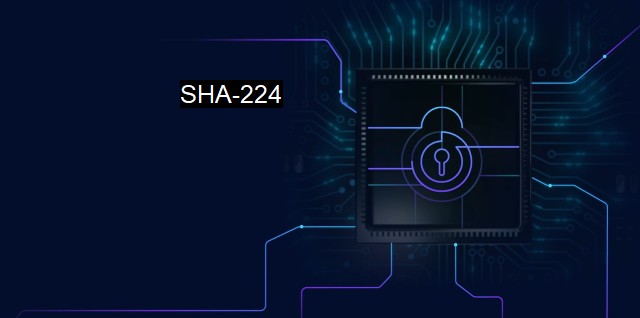What is SHA-224?
Secure Hash Algorithm 224, commonly known as SHA-224, is a member of the Secure Hash Algorithm (SHA) family that is vital in cybersecurity. As an element of cybersecurity, SHA-224 mainly functions in maintaining the integrity of data. It does so by reducing the likelihood of altered data being perceived as original or authentic data.SHA-224 is a hash function that generates a 224-bit hash value. This characteristic differentiates it from other hash value computations like SHA-1 and SHA-256. Being the enhanced version of SHA-1, it offers more robust security attributes.
SHA-224 is essential for cryptographic functions, particularly in providing data authenticity. The algorithm in cybersecurity guarantees the data's integrity as part of the data archiving system. It ensures that any changes in the data are detected. This capacity of SHA-224 in maintaining the originality of data is an affirmative action towards the realization of reliable and secure cyberspace, a necessity in today's digital age.
SHA-224, like other secure hash algorithms, performs an integral function in the creation of digital signatures, which are fundamental in data security and cyber threat management. The digital signatures play a critical role in reinforcing cybersecurity, essentially in instances where data is transmitted over the internet. They give certainty of the sender's identity and the originality of the transmitted data.
The value of the SHA-224 in the protection of digital data lies in its ability to create unique hash values for every unique input. It derives a fixed-length string of digits, enclosing the hash value from variable-length strings of input. This property ensures that even the minutest alteration in input data results in a significantly different hash value. Such a disparity signals a red flag, thereby hinting at potent data compromise. In turn, the alarm propels for immediate action or measures to remedy the situation, hence reinforcing data security.
Within the antivirus and the broader cybersecurity industry, the algorithm has a unique place due to its capacity to detect alterations, which is efficient in virus detection. While most viruses alter the behavior or structure of system files, the hash values change correspondingly. Antivirus software utilizes hash functions like SHA-224 to generate hash values for each file, which are then compared against a database of hash values associated with known viruses. If a match is found, the file is tagged as malicious, quarantined, or eliminated.
SHA-224 is commonly used in the validation and storage of passwords in cybersecurity. Instead of storing user passwords in plaintext, which is a security risk, systems store the hash of the password that the SHA-224 has generated. During the authentication process, the password provided by the user is hashed again, and the hash is compared with the stored hash. If they match, the password is accepted as correct.
Despite the widespread reliance on SHA-224, an inherent demerit of hash functions is their potential susceptibility to brute-force and dictionary attacks. These types of attacks systematically attempt every possible combination of password until the correct one is found. Although these attacks require significant computational power and time, the increasing processing speed of modern computers continues to make these attacks more feasible.
Despite having a few potential weaknesses, SHA-224 is nonetheless an acclaimed tool in cybersecurity due to its proven ability to maintain data integrity. The unpredictability of its hash value fortifies security, concealing data from intrusion and guaranteeing cybersecurity. Whether in the realms of securing data transmission, reinforcing antivirus systems, or validating passwords, the role of SHA-224 remains prominent, particularly in delivering resilient cyber risk management. Therefore, SHA-224 is proof that while the cyber world might be complexly vulnerable, the right cyber defence mechanisms like proper hash functions can maintain data security and integrity.

SHA-224 FAQs
What is SHA-224?
SHA-224 is a cryptographic hash function that generates a 224-bit hash value. It is commonly used in cybersecurity and antivirus software to verify digital signatures and ensure message integrity.How does SHA-224 work?
SHA-224 works by taking input data and processing it through a compression function to produce a fixed-size output. The resulting hash value is unique to the input data and any changes to the input will result in a different hash value.Why is SHA-224 important for cybersecurity and antivirus software?
SHA-224 is important for cybersecurity and antivirus software because it can be used to verify the authenticity and integrity of data. By comparing the hash value of a file, message, or software program with a known value, users can ensure that the data has not been tampered with or corrupted.Is SHA-224 secure?
SHA-224 is considered to be a secure cryptographic hash function, but it has been found to be vulnerable to certain attacks such as length extension attacks. As such, it is recommended to use stronger hash functions such as SHA-256 or SHA-3 for applications that require higher levels of security.| | A | | | B | | | C | | | D | | | E | | | F | | | G | | | H | | | I | | | J | | | K | | | L | | | M | |
| | N | | | O | | | P | | | Q | | | R | | | S | | | T | | | U | | | V | | | W | | | X | | | Y | | | Z | |
| | 1 | | | 2 | | | 3 | | | 4 | | | 7 | | | 8 | | |||||||